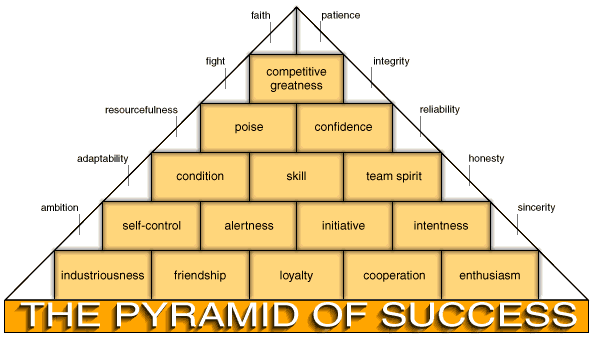Kindness in words creates confidenceWooden’s Wisdom – Volume 4, Issue 185
download PDF
Kindness in Words Creates Confidence,
Kindness in Thinking Creates Profoundness,
Kindness in Giving Creates Love
Each part of this quote (a favorite of Coach Wooden’s) by the famous Chinese philosopher Lao Tzu (571-531 BC), is valuable.
This issue focuses on why the idea Kindness in words creates confidence was such an important part of Coach Wooden’s communication style.
Coach Wooden’s communication style was effective in helping his players develop confidence and pride in what they did. If kindness in words creates confidence it is also true that being demeaning, derogatory on a personal level or condescending in words does not create confidence. Coach was never any of these three things.
In his book Coach Wooden’s Leadership Game Plan for Success, with Steve Jamison, Coach put it this way:
I was often critical of players, but I tried hard to avoid personal attacks, embarrassment, or demeaning comments, which would make them less likely to take my criticism to heart.
Doug McIntosh, a former player and a member of the 1964 and 1966 national championship teams, described Coach this way:
He was strict, but there was no sense of fear of him by players. We knew there was nothing personal in his criticism or comments.
Profanity was not used by Coach because besides the fact that it sets a poor example of self-control, it is certainly no confidence builder and its instructive value is at best questionable.
Coach’s words of kindness were impactful because they were sincere, not excessive.
In his book Wooden on Leadership, with Steve Jamison, Coach expanded on the idea:
Positive words become meaningless when offered habitually and excessively. I avoided the phrase, "that’s great" instead I would say "good, very good, getting better" I kept in mind that how I conveyed information was often as important as the information itself. My tone was measured and my demeanor controlled.
About 85% of Coach’s communication was simply instructive. His players were not distracted by undue criticism or undeserved compliments from his communication.
As a result, they were able to focus on the instruction he was giving and build confidence in themselves.
This formula works equally well on and off the court.
Yours in Coaching,
Craig Impelman


